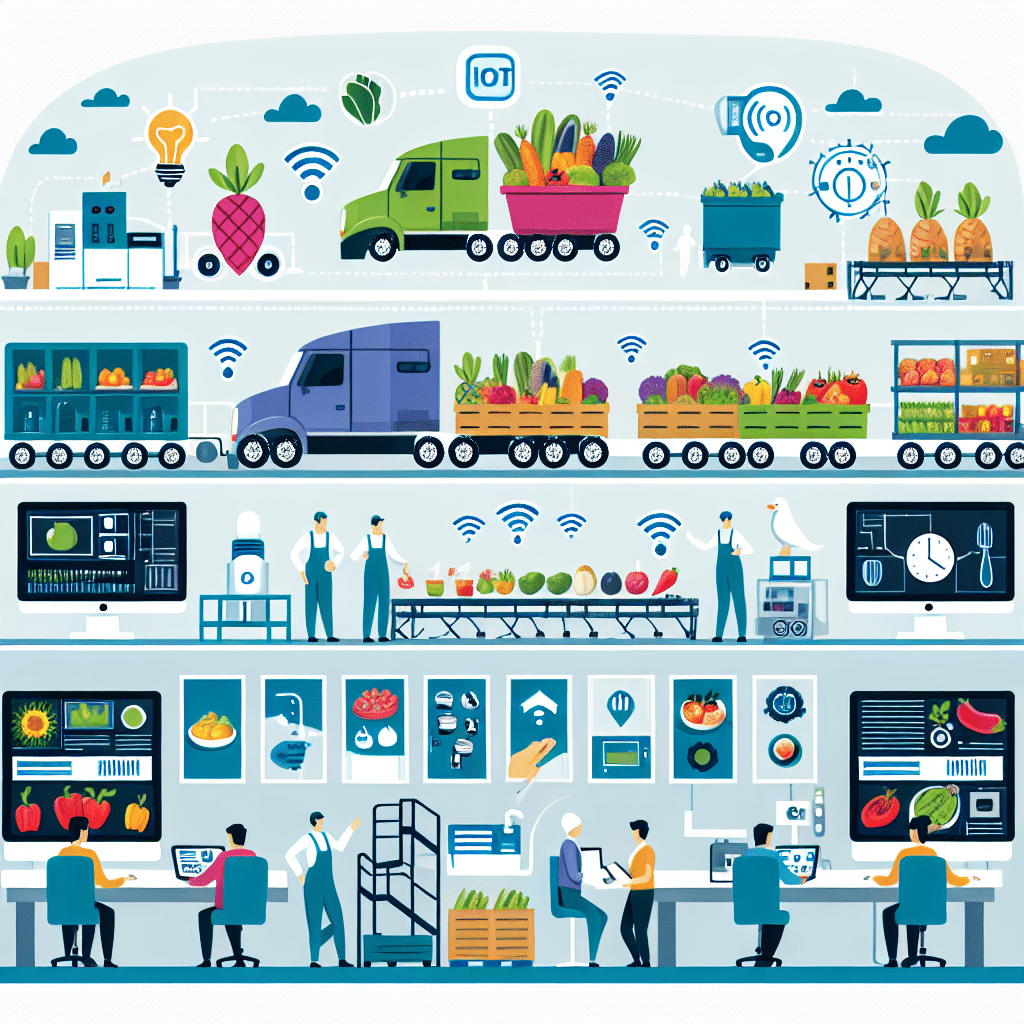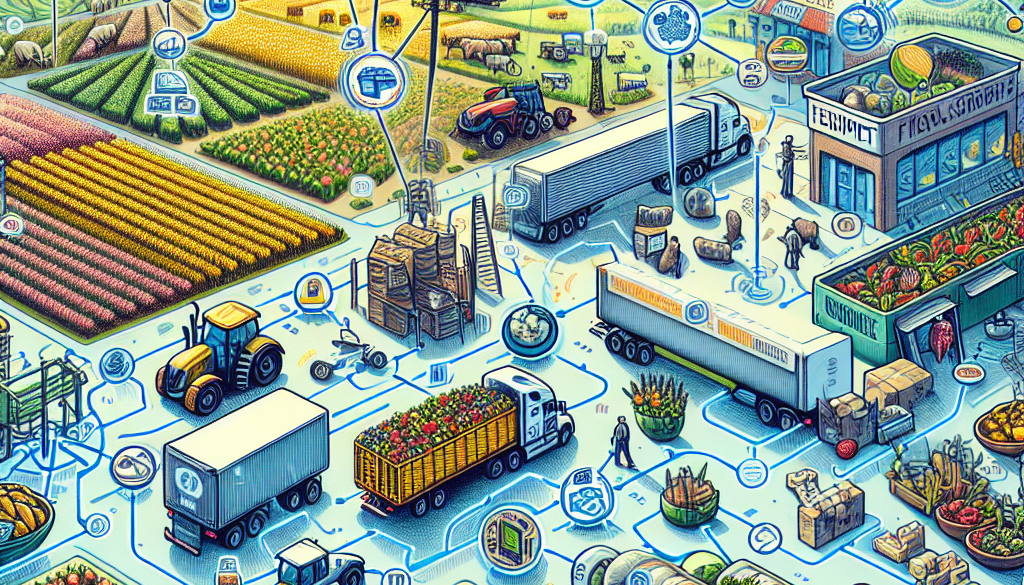Key Ways IoT is Transforming Food Supply Chains
-
Table of Contents
- IoT Revolutionizing Food Supply Chains: Key Transformative Ways
- Enhanced Traceability and Transparency
- Optimized Logistics and Reduced Waste
- Smart Farming for Increased Production
- Energy Management and Sustainability
- Quality Control and Safety Assurance
- Conclusion
- ETprotein: Your Partner for High-Quality Protein Products
IoT Revolutionizing Food Supply Chains: Key Transformative Ways

The Internet of Things (IoT) is rapidly transforming industries worldwide, and the food supply chain is no exception. With the global population expected to reach 9.7 billion by 2050, the pressure on food supply chains to become more efficient, sustainable, and safe is immense. IoT technology is at the forefront of addressing these challenges, offering innovative solutions that enhance visibility, optimize operations, and ensure food quality from farm to fork. In this article, we will explore the key ways in which IoT is revolutionizing the food supply chain.
Enhanced Traceability and Transparency
One of the most significant impacts of IoT on the food supply chain is the improvement in traceability and transparency. IoT devices such as RFID tags and sensors can track products throughout the supply chain, providing real-time data on location, temperature, humidity, and other critical factors. This level of detail allows for:
- Immediate identification and isolation of contaminated or spoiled products, reducing the risk of foodborne illnesses.
- Accurate tracking of products’ journey, which helps in verifying the authenticity of labels such as “organic” or “fair trade.”
- Enhanced consumer trust, as customers can access detailed information about the origin and handling of their food.
According to a study by the Food Marketing Institute, 75% of consumers are more likely to buy a product that provides in-depth product information beyond what is on the physical label. IoT facilitates this level of disclosure, meeting consumer demands for transparency.
Optimized Logistics and Reduced Waste
IoT technology is instrumental in optimizing logistics within the food supply chain. By leveraging data from IoT devices, companies can:
- Monitor the condition of food in transit and adjust environmental conditions to extend shelf life.
- Implement predictive maintenance on transportation vehicles, reducing the risk of breakdowns that can lead to spoilage.
- Optimize delivery routes for efficiency, reducing fuel consumption and greenhouse gas emissions.
Statistics show that IoT can help reduce food waste significantly. The World Economic Forum reports that IoT could create a value of $1.2 trillion annually by 2025 by improving the traceability of food items, thus reducing waste by 5%.
Smart Farming for Increased Production
At the beginning of the supply chain, IoT is transforming agriculture through smart farming practices. IoT-enabled devices can:
- Monitor soil moisture and nutrient levels to optimize irrigation and fertilization schedules.
- Track livestock health and behavior, leading to early detection of illnesses and better herd management.
- Automate operations such as feeding, planting, and harvesting, increasing efficiency and reducing labor costs.
As per the American Farm Bureau Federation, farmers who use advanced digital technologies can see profit increases of up to $11 per acre for corn and $2.60 per acre for soybeans.
Energy Management and Sustainability
IoT devices play a crucial role in managing energy consumption throughout the food supply chain. Smart sensors and automation can:
- Control lighting, heating, and cooling in warehouses and retail environments, reducing energy costs.
- Monitor equipment performance to ensure that energy is not wasted on malfunctioning machinery.
- Facilitate the use of renewable energy sources by optimizing their integration into the power grid.
Energy savings from IoT applications in the food supply chain could amount to 18% of total energy consumption, according to a report by the World Economic Forum.
Quality Control and Safety Assurance
IoT technology is critical in maintaining quality and safety standards in the food supply chain. With IoT sensors, companies can:
- Continuously monitor food storage conditions to ensure compliance with safety regulations.
- Automatically detect the presence of contaminants or allergens, preventing potential health hazards.
- Implement blockchain technology to create immutable records of quality checks and safety certifications.
A study by DHL and Cisco estimates that IoT technologies could generate $1.9 trillion in value for the global supply chain and logistics sector, with a significant portion of this value stemming from improvements in quality control and safety assurance.
Conclusion
The Internet of Things is revolutionizing the food supply chain by enhancing traceability, optimizing logistics, enabling smart farming, managing energy efficiently, and ensuring quality and safety. These transformative effects not only contribute to a more sustainable and secure global food system but also offer economic benefits to all stakeholders involved. As IoT technology continues to evolve, its potential to further improve the food supply chain remains vast and promising.
ETprotein: Your Partner for High-Quality Protein Products
In line with the advancements in the food supply chain, ETprotein is committed to providing top-tier protein products that meet the highest standards of quality and safety. Their extensive range of organic bulk vegan proteins and L-(+)-Ergothioneine (EGT) products are perfect for businesses looking to incorporate reliable and sustainable ingredients into their offerings. With ETprotein’s commitment to non-GMO, allergen-free products with high purity levels, you can ensure that your food products are aligned with the latest supply chain innovations and consumer expectations.
About ETprotein:
ETprotein, a reputable protein and L-(+)-Ergothioneine (EGT) Chinese factory manufacturer and supplier, is renowned for producing, stocking, exporting, and delivering the highest quality organic bulk vegan proteins and L-(+)-Ergothioneine. They include Organic rice protein, clear rice protein, pea protein, clear pea protein, watermelon seed protein, pumpkin seed protein, sunflower seed protein, mung bean protein, peanut protein, and L-(+)-Ergothioneine EGT Pharmaceutical grade, L-(+)-Ergothioneine EGT food grade, L-(+)-Ergothioneine EGT cosmetic grade, L-(+)-Ergothioneine EGT reference grade and L-(+)-Ergothioneine EGT standard. Their offerings, characterized by a neutral taste, non-GMO, allergen-free attributes, with L-(+)-Ergothioneine purity over 98%, 99%, cater to a diverse range of industries. They serve nutraceutical, pharmaceutical, cosmeceutical, veterinary, as well as food and beverage finished product distributors, traders, and manufacturers across Europe, USA, Canada, Australia, Thailand, Japan, Korea, Brazil, and Chile, among others.
ETprotein specialization includes exporting and delivering tailor-made protein powder and finished nutritional supplements. Their extensive product range covers sectors like Food and Beverage, Sports Nutrition, Weight Management, Dietary Supplements, Health and Wellness Products, and Infant Formula, ensuring comprehensive solutions to meet all your protein needs.
As a trusted company by leading global food and beverage brands and Fortune 500 companies, ETprotein reinforces China’s reputation in the global arena. For more information or to sample their products, please contact them and email sales(at)ETprotein.com today.












